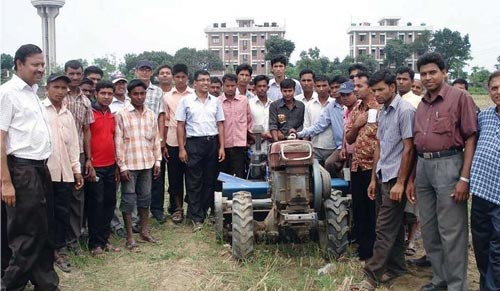 Over 60 researchers, field technicians, farmers, machinery manufacturers, service providers, and extension workers attended two recent conservation agriculture (CA) training events in Bangladesh. The first event was held at the Bangladesh Agriculture Research Institute (BARI) station in Comilla on 28-29 April, followed by an event at the Wheat Research Centre of BARI in Dinajpur on 04-05 May. The events focused on machinery operation and maintenance, as well as the agronomy of dry direct-seeded rice (DSR). Both were part of joint CIMMYT-IRRI efforts to promote sustainable ricemaize systems in collaboration with several national Bangladesh partners.
Over 60 researchers, field technicians, farmers, machinery manufacturers, service providers, and extension workers attended two recent conservation agriculture (CA) training events in Bangladesh. The first event was held at the Bangladesh Agriculture Research Institute (BARI) station in Comilla on 28-29 April, followed by an event at the Wheat Research Centre of BARI in Dinajpur on 04-05 May. The events focused on machinery operation and maintenance, as well as the agronomy of dry direct-seeded rice (DSR). Both were part of joint CIMMYT-IRRI efforts to promote sustainable ricemaize systems in collaboration with several national Bangladesh partners.
At both locations, participants learned about the power tiller operated seeder (PTOS) and the bed former/planter attached with the Chinese-made two-wheel tractor. This equipment is promoted by the project for the rapid establishment of maize, rice, and other crops under CA-based tillage systems such as zero tillage, reduced or minimum tillage, and raised beds. Participants also learned various methods to calibrate seed rates for DSR and decided that fluted roller metering devices with 8 or 16 grooves are the best currently available option for sowing DSR. They also learned basic agronomy for DSR and unpuddled transplanted rice, both of which require the use of the demonstrated machinery.
 “Machinery operation and maintenance is vital for rapid dissemination of CA-based technologies,” said Jagadish Timsina, IRRI-CIMMYT senior cropping system agronomist. He added that this ACIAR-funded ricemaize project has been adapting and evaluating the PTOS and the bed former/planter at project sites, and has been refining these machines for their use in different soils with the help of agriculture engineers from the national agriculture research intuitions involved in the project. The project has given special emphasis to training and capacity building for machine use and has already trained more than 120 people from government and non-governmental organizations, as well as farmers, service providers, machinery manufacturers, and extension workers since it started in November 2008.
“Machinery operation and maintenance is vital for rapid dissemination of CA-based technologies,” said Jagadish Timsina, IRRI-CIMMYT senior cropping system agronomist. He added that this ACIAR-funded ricemaize project has been adapting and evaluating the PTOS and the bed former/planter at project sites, and has been refining these machines for their use in different soils with the help of agriculture engineers from the national agriculture research intuitions involved in the project. The project has given special emphasis to training and capacity building for machine use and has already trained more than 120 people from government and non-governmental organizations, as well as farmers, service providers, machinery manufacturers, and extension workers since it started in November 2008.
Thanks to those who assisted with and attended these two events, including Israil Hossain and M. Wohab, principal scientific officers and agriculture engineers from BARI who helped in Dinajpur; M. Wohab and A. Rahman, principal scientific officers and agriculture engineers from BRRI who helped in Comilla; T. P. Tiwari, CIMMYT cropping system agronomist and the coordinator of the USAID Famine project; and Timsina.
 Capacity development
Capacity development